So, you’ve got a pooch that’s suddenly turned into a homebody, huh? Well, you’re not alone! Many dog owners scratch their heads over this curious behavior, “Why does my dog not want to go outside” ? Let’s dive into the canine mind and figure out why your furry friend is giving the great outdoors the cold shoulder.
Understanding Your Pup’s Quirks:
Fear or Anxiety:
Picture this: your pup’s all set for an outdoor adventure, but the moment you crack open the door, they do a U-turn faster than a cat spotting a cucumber! It could be fear or anxiety rearing its ugly head. Maybe they’re spooked by loud noises or just feeling unsure about what lies beyond the safety of their den.
Health Issues:
Could it be a case of “my bones are creakier than the floorboards in an old haunted house”? Yup, health issues can turn even the most adventurous pup into a couch potato. If your furry friend is feeling under the weather, they might opt for cozying up indoors instead of braving the elements.
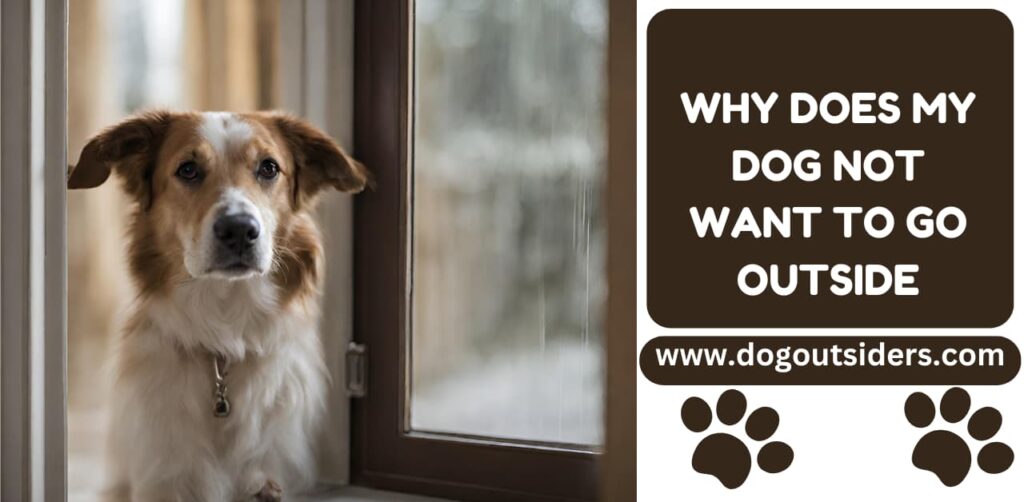
Weather Woes:
Ah, the joys of weather forecasts! Just like us humans, dogs have their own preferences when it comes to the great outdoors. If it’s raining cats and dogs (pun intended) or hotter than a chili pepper, your pup might give outdoor excursions a hard pass.
Past Paw-sitive or Paw-negative Experiences:
Remember that one time your pooch got spooked by a squirrel and ended up doing the “squirrel scramble” back indoors? Yep, past experiences can leave a lasting impression on our furry friends. If they’ve had a frightful encounter or a bad case of the zoomies during a storm, they might think twice about venturing out again.
Cracking the Code:
Addressing Fear and Anxiety:
So, your pooch is a bit of a scaredy-cat? No worries! Start by easing them into outdoor adventures, one paw at a time. Treats, belly rubs, and heaps of encouragement can work wonders in boosting their confidence and making outdoor time less daunting.
Managing Health Hiccups:
If your furry friend seems more sluggish than a sloth on a Sunday, it might be time for a trip to the vet. A thorough check-up can uncover any hidden health issues, and your vet can prescribe the paw-fect treatment to get your pup back on their paws!
Weather Adaptation Tactics:
When the weather outside is frightful, make sure your pup’s digs are delightful! Providing cozy shelter and adjusting outdoor activities to suit the weather can turn a drab day into a tail-wagging extravaganza.
Overcoming Past Paw-sitive or Paw-negative Experiences:
Time to rewrite the script! Desensitization techniques and heaps of positive reinforcement can help your pup conquer their fears and create new, paw-sitive associations with outdoor adventures.
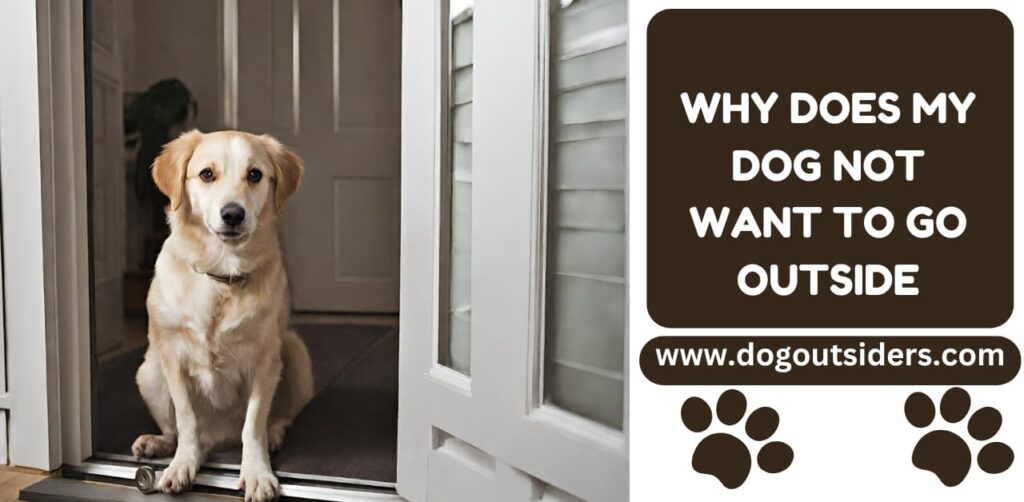
Training Tips and Tricks:
Consistent Training Regimen:
Consistency is key, my friend! By setting clear boundaries and practicing obedience commands, you can help your pup feel more at ease and confident in the great outdoors.
Seeking Professional Help:
If your pup’s reluctance to venture outdoors persists, it might be time to call in the big dogs (pun intended). A professional dog trainer or behaviorist can work their magic and help your furry friend overcome their outdoor aversion.
Conclusion:
So there you have it, folks! Whether it’s fear, health hiccups, weather woes, or past experiences holding your furry friend back, there’s always a paw-sitive solution to be found. With a dash of patience, a sprinkle of humor, and heaps of love, you and your pup will be back to enjoying outdoor adventures in no time!
FAQ’s:
You can look for signs of anxiety in your dog, such as trembling, excessive panting, pacing, whining, or attempting to hide or escape. Additionally, if your dog shows reluctance or avoidance behaviors when it’s time to go outside, it could indicate anxiety about outdoor experiences.
If your dog refuses to go outside during bad weather, it’s essential to respect their discomfort and not force them. Provide indoor enrichment activities to keep them mentally stimulated and consider using indoor potty options if necessary. Gradually introduce them to outdoor experiences during milder weather conditions and use positive reinforcement to create positive associations with outdoor outings.
Yes, there are several natural remedies that may help calm anxious dogs, including aromatherapy, herbal supplements, pheromone diffusers, and calming music or sound therapy. However, it’s essential to consult with your veterinarian before using any natural remedies to ensure they are safe and appropriate for your dog’s specific needs.
Yes, lack of socialization can contribute to a dog’s reluctance to go outside, especially if they have not been exposed to various environments, people, and animals during critical developmental periods. Proper socialization from a young age helps dogs feel more confident and comfortable in different situations and environments.
Yes, it’s normal for older dogs to become less interested in outdoor activities as they age. Aging can bring about physical changes such as arthritis or decreased mobility, which may make outdoor activities less appealing or comfortable for older dogs. However, it’s essential to continue providing opportunities for gentle exercise and outdoor stimulation tailored to your senior dog’s needs. Regular veterinary check-ups can also help address any age-related health issues that may impact their outdoor enjoyment.

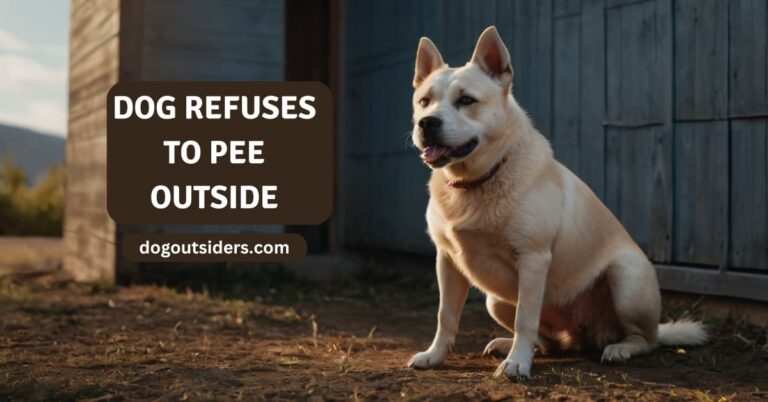

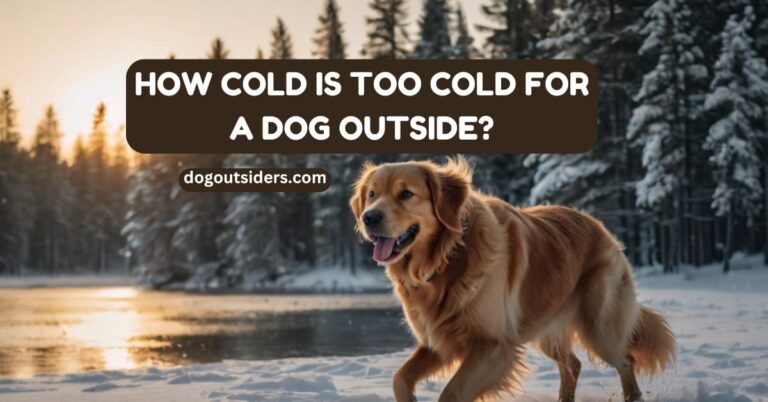
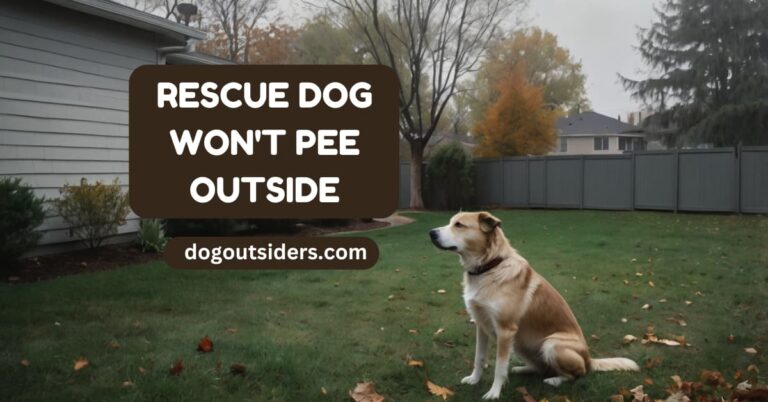

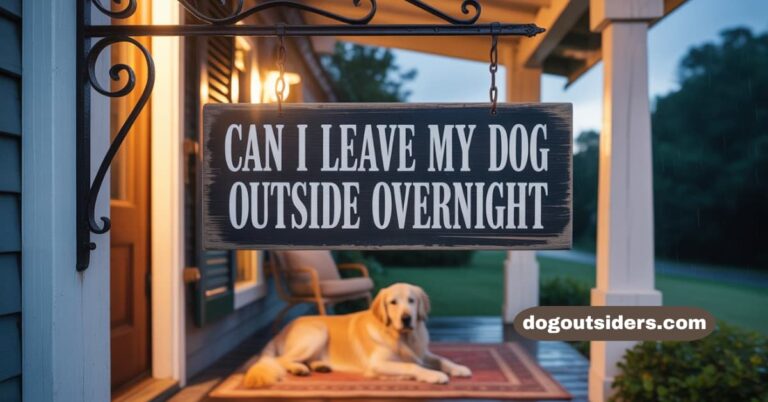
4 Comments